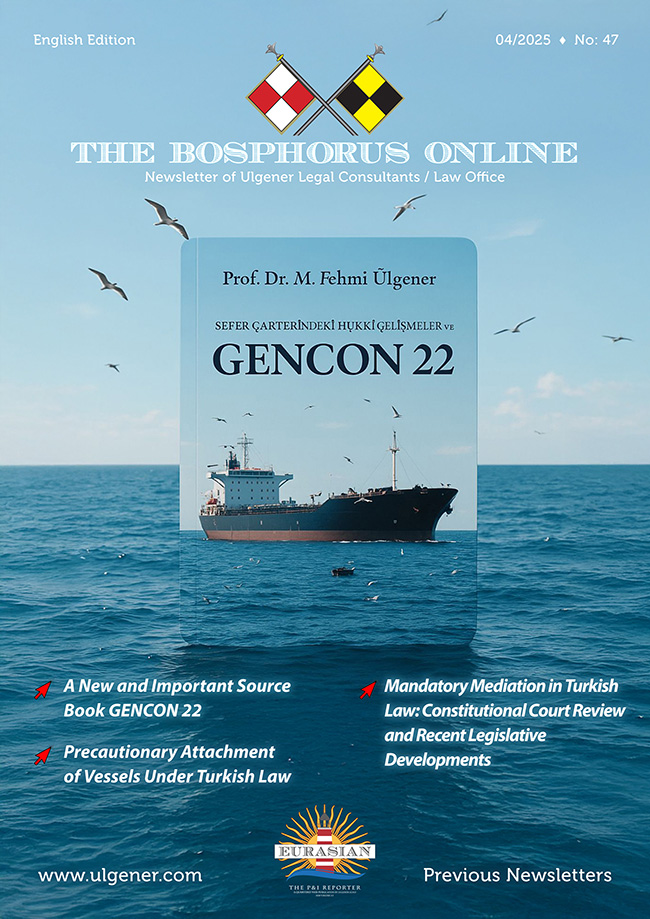
Ulgener

A New and Important Source Book GENCON 22
The book about the Gencon 22 charter party, which has been worked on for many years by Professor Fehmi Ülgener especially coupled with his post at the Documentary Committee of Bimco, was released at the beginning of March.
The book consists of two main sections:
The first part of the book examines the Gencon 22 charter party in detail, revealing the reasons for the clauses and providing a broad perspective by comparing it with the Gencon 94 and 76 forms. As is known, the Gencon 22 charter party, which Mr. Ülgener personally participated in preparing, is one of the most widely used standard contracts in dry bulk shipping.
Many significant changes have been made with the Gencon 22 charter party. In particular, the shipowner's liability system has been completely renewed and brought into line with the liability system that will arise from bills of lading by directly referring to the Hague-Visby Rules.
In the second part of the book, the developments that have emerged in recent years regarding voyage charters are explained in parallel with English court decisions; it is possible to summarize the relevant headings and the decisions explained, which are important to know in terms of practice, as follows:
Damages arising from the late arrival of the ship to the loading port (the Pacific Voyager, 2018) The execution of the voyage charter party contract begins not from the start of loading, but from the ship's departure from her location towards the loading port. Any delay during this period can result in consequences against the shipowner, independent of the termination clause in the charter party, the shipowner may be liable to compensate the charterer for damages suffered due to this delay.
Demurrage and Delay Damages (“demurrage vs damages for detention”) The relevant section clarifies under which circumstances the shipowner can claim demurrage fees and under which circumstances they can claim actual damages arising from delays when the ship stays at the port longer than agreed in the charter party.
Arrival of the Ship (“arrived ship”) It is important to determine when the ship has arrived at the port in order to calculate waiting times during the execution of the voyage charter party contract. This section explains the point of arrival in this regard.
Force Majeure and Frustration of Contract (“doctrine of frustration”) Force majeure terminates the obligations of both parties arising from the contract. However, the concept of force majeure does not exist in English law; instead, a similar concept called “frustration” is present. This section evaluates this issue and explains the differences between the two concepts with examples.
Safe Port and Safe Berth Concepts (the Reborn, 2009, MT Athos I 2020) Although these concepts have been discussed and explained for years, recent cases have examined whether the party responsible for these concepts is liable for fault or strict liability. This section shows the final point reached on this issue and discusses the liability systems.
Termination of the Charter Party by the Charterer (the MTM Hong Kong, 2015, the Golden Victory, 2007) The charterer can terminate the charter party contract for a justified reason, and in some cases (especially when the freight rate significantly drops after the contract is made), they may have to withdraw from the contract. The difference between these situations is that in the case of justified reason, the charterer does not have to pay any compensation to the shipowner, whereas in the case of withdrawal, the charterer is liable to compensate the shipowner for damages. This section examines both situations and explains how the compensation to be paid in the case of withdrawal is calculated in parallel with the principles of English law.
Shipowner's Liability for Damages to Cargo (the Limnos, 2008, the Thorco Lineage 2023, the Giant Ace, 2023, the CMA CGM Libra 2021, the Hill Harmony 2001, the Tasman Pioneer 2007, the Lady M case 2019, the Eurasian Dream, 2002, the Volcafe, 2018) This section re-examines the frequently encountered disputes in maritime trade law in parallel with current case law. Some of these court decisions have examined which types of damages should be considered in terms of limiting liability, especially explaining the concept of “goods lost or damaged” while others have provided solutions regarding the starting point of the limitation period. Another decision has accepted that starting the voyage with a faulty passage plan is a violation of the shipowner's obligation to make the ship seaworthy. This court decision states that the fault in the passage plan does not necessarily make the ship unseaworthy; for this, the fault in the passage plan must be significant enough to make the ship unseaworthy, and there must be a causal link between the fault in the passage plan and the damage caused. This decision, which is examined in detail in the book, has a significant impact on maritime trade. Due to this decision, shipowners need to prepare their passage plans and documentation much more carefully and meticulously before the voyage. In this regard, compliance with the rules set by IMO in November 1999 regarding “Passage Plan” has gained importance.
Charter Party – Bill of Lading Relationship (the Starsin, 2004) This section examines and resolves the issue of who is considered to have made the transportation commitment for the cargo loaded on the ship as a result of the charterer's sub-carriage contract with the parties to the charter party contract.
Sanctions Sanctions are one of the problematic issues in international trade today. The final section of the book examines court decisions on this issue and aims to enlighten the reader about sanctions (Lamesa Investment – Synergy, 2020, Mamancochet Mining Limited – Aegis Managing Agency, 2018, Gravelor Shipping-GTLK Asia M5, 2023, MUR Shipping BV RTI Ltd 2024).

Mandatory Mediation in Turkish Law: Constitutional Court Review and Recent Legislative Developments
-Gül Alpay
As of 1 January 2018, mediation became a mandatory precondition for bringing legal action in disputes arising from individual or collective employment contracts, including claims for employee or employer receivables, compensation, and reinstatement.
A parallel development occurred with the introduction of Article 5/A to the Turkish Commercial Code (TCC) No. 6102. This amendment extended the mandatory mediation requirement to commercial disputes where the subject matter involves monetary claims or compensation. In both labour and commercial contexts, parties are now required to seek resolution through mediation before accessing the courts.
Procedural Aspects of Mandatory Mediation
Mediation applications must be filed with the mediation offices located within courthouses. In jurisdictions lacking a dedicated office, the secretariat of the civil court of peace acts as the mediation office. Mediators are appointed from the official registry by mediation office personnel. However, if the parties agree on a specific registered mediator, that individual will be appointed.
No fee is charged for submitting a mediation request. If the parties fail to reach a settlement, the Ministry of Justice covers the cost of the first two hours of mediation. In the event of a settlement, mediation costs are shared equally between the parties, unless otherwise agreed.
Parties may attend the sessions personally or through legal counsel. If a party is represented by an attorney, the power of attorney must explicitly authorise participation in mediation.
If the mediation process fails, the parties may proceed to litigation. Under the original framework, a party who failed to attend the initial mediation meeting without a valid excuse would be held liable for all litigation costs—even if they were ultimately successful in the lawsuit—and would be denied recovery of attorney’s fees.
Constitutional Court Intervention
This rule was challenged before the Constitutional Court, which declared it unconstitutional. The Court held that penalising a party who ultimately prevails in court—merely for failing to attend the first mediation meeting—by denying them litigation costs and attorney’s fees, imposed a disproportionate restriction on the rights to property and access to a court.
In its decision, the Court reasoned that such a rule placed an excessive burden on litigants and disrupted the necessary balance between public interest and individual rights. It therefore concluded that the provision violated Articles 13, 35, and 36 of the Constitution. However, to prevent a legal vacuum, the Court postponed the entry into force of its annulment decision for nine months from the date of publication. Accordingly, the provision was formally repealed as of 18 January 2025.
Revised Framework
Following the annulment, the relevant legislation was amended to address the Constitutional Court’s concerns while still incentivising good-faith participation in mediation. Under the new framework, if a party fails to attend the initial mediation session without a valid excuse and the process is terminated as a result, this is recorded in the final report. In the subsequent lawsuit, even if the absent party prevails in whole or in part, they will be held liable for half of the litigation costs that would otherwise be borne by the opposing party. Additionally, any attorney’s fee awarded in their favour will be capped at 50% of the amount specified under the Minimum Attorney Fee Tariff.
This revised structure aims to encourage participation in mediation without infringing upon litigants’ constitutional rights, striking a more proportionate balance between procedural efficiency and access to justice.

Precautionary Attachment of Vessels Under Turkish Law
- Aybike Kopuz
One of the most effective means of securing claims in maritime trade is, undoubtedly, the precautionary attachment (arrest) of a vessel. This time-competitive legal remedy serves as a strong pressure mechanism against the debtor.
Under the Turkish Commercial Code No. 6102 (“TCC”), the existence of a “maritime claim” constitutes grounds for an arrest. Maritime claims, which are subject to the numerus clausus principle, are set out in Art.1352 of the TCC, as incorporated from the 1999 United Nations International Convention on Arrest of Ships.
Pursuant to Art.1352 of the TCC, a maritime claim means a claim arising from one or more of the following:
a) Loss or damage caused by the operation of the ship;
b) Loss of life or personal injury occurring, whether on land or on water, in direct connection with the operation of the ship;
c) Salvage operations or any salvage agreement, including, if applicable, special compensation relating to salvage operations in respect of a ship which by itself or its cargo threatened damage to the environment;
d) damage or threat of damage caused by the ship to the environment, coastline or related interests; measures taken to prevent, minimize, or remove such damage; compensation for such damage; costs of reasonable measures of reinstatement of the environment actually undertaken or to be undertaken; loss incurred or likely to be incurred by third parties in connection with such damage; and damage, costs, or loss of a similar nature to those identified in this subparagraph (d);
e) costs or expenses relating to the raising, removal, recovery, destruction or the rendering harmless of a ship which is sunk, wrecked, stranded or abandoned, including anything that is or has been on board such ship, and costs or expenses relating to the preservation of an abandoned ship and maintenance of its crew;
f) any agreement relating to the use or hire of the ship, whether contained in a charter party or otherwise;
g) any agreement relating to the carriage of goods or passengers on board the ship, whether contained in a charter party or otherwise;
h) loss of or damage to or in connection with goods (including luggage) carried on board the ship;
i) General average;
j) Towage;
k) Pilotage;
l) Goods, materials, provisions, bunkers, equipment (including containers) supplied or services rendered to the ship for its operation, management, preservation or maintenance;
m) Construction, reconstruction, repair, converting or equipping of the ship;
n) Port, canal, dock, harbour and other waterway dues and charge;
o) Wages and other sums due to the members of the ship's complement in respect of their employment on the ship, including costs of repatriation and social insurance contributions payable on their behalf;
p) Disbursements incurred on behalf of the ship or its owners;,
r) Insurance premiums (including mutual insurance calls) in respect of the ship, payable by or on behalf of the shipowner or demise charterer;
s) Any commissions, brokerages or agency fees payable in respect of the ship by or on behalf of the shipowner or demise charterer;
t) Any dispute as to ownership or possession of the ship;
u) Any dispute between co-owners of the ship as to the employment or earnings of the ship;
v) A mortgage or a "hypothèque" or a charge of the same nature on the ship;
y) Any dispute arising out of a contract for the sale of the ship.”
An arrest decision may be ordered for any vessel located in Turkish waters, regardless of her flag. In fact, even where there is an agreement between the parties on jurisdiction, arbitration, or the applicable law regarding the maritime claim, Turkish courts are still authorized to grant an arrest. The flag of the vessel is relevant only in determining the competent court. While the law provides various alternatives for competent courts, in practice, due to the need for speed and the element of surprise effect in such measures, applications are typically made to the court located where the vessel is anchored.
In order to obtain an arrest decision, the claimant must demonstrate that the claim falls within one of the maritime claims listed above and must present evidence sufficient to satisfy the court of the monetary value of the claim.
Furthermore, to secure an arrest, the claimant is required to provide security in the amount of 10,000 Special Drawing Rights (“SDR”). (While we reiterate our recommendation that the exchange rate applicable on the date of security be used in the calculation, as of today, SDR = TRY 51.5618)
The claimant must apply for enforcement of the arrest order at the enforcement office located where the vessel is present within three business days from the date the order is issued. Otherwise, the arrest order will automatically lapse. Upon request, the enforcement office promptly enforces the arrest.
The vessel subject to the arrest order will be detained by the enforcement officer. Notice of the arrest and detention will be served on the master, the owner, the disponent owner (if any), or their representatives.


